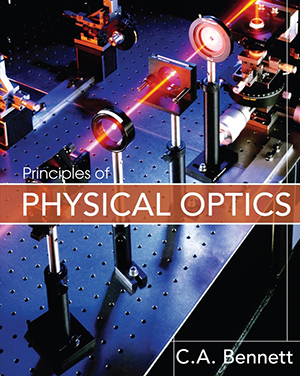
Principles of Physical Optics
By Charles A. Bennett
Principles of Physical Optics offers modern topic coverage, emphasis and pedagogy. This course will prove to be attractive to physics majors, and provide students with expertise valued in industry. Principles provides students with a completely modern approach to the field of optics, covering a wide range of topics. This includes detailed discussions on geometric optics, superposition and interference, and diffraction. Students will learn the latest information on lasers, optical imaging, polarization, and nonlinear optics.
Schedule a Demo Sign Up for a Test Drive Adopt WileyPLUSWant to learn more about WileyPLUS? Click Here
Read, Study, and Practice
Students learn course concepts using the complete online eTextbook, flashcards, crossword puzzles, practice questions, videos, and animations. Organized by learning objective, students can filter for relevant learning resources based on what they need to study most and print any section of the eTextbook.
ORION Adaptive Practice (when available)
Every student has a different starting point, and adaptive practice provides endless opportunities for practice to effectively prepare for class or quizzes and exams. Active retrieval of information with practice questions is proven to improve retention of information better than re-reading or reviewing the material, and students who use adaptive practice to prepare for exams do significantly better than those who do not. Students begin with a quick, chapter-level diagnostic to determine their initial level of understanding, and they can use the dashboard and quick reports to see what topics they know and don’t know.
Assignments
Students who fully engage in WileyPLUS assignments do better in the course by more than a letter grade. Auto-graded assignments give students immediate feedback based on flexible assignment settings determined by the instructor, while the notification center allows students to set their own email notification policies to stay on track.
Instructors can select from extensive and reliable question banks to create and deploy reading, practice, homework, pre-post lectures, and assessment assignments. This course includes essay, label drag-and-drop, multiple choice, text entry, and true-/false question types.
Gradebook
Students know where they stand on WileyPLUS assignments, and they can track progress by learning objective.
Instructors have insights into student performance at the granular question attempt and can track trends by individual student, assignment, or learning objective. Flexible policies allow instructors to change points, set assignment weighing policies, extend individual due dates, or drop the lowest grade.
Chapter 1. The Physics of Waves
Chapter 2. Electromagnetic Waves and Photons
Chapter 3. Reflection And Refraction
Chapter 4. Geometric Optics
Chapter 5. Superposition and Interference
Chapter 6. Diffraction
Chapter 7. Lasers
Chapter 8. Optical Imaging
Chapter 9. Polarization and Nonlinear Optics

